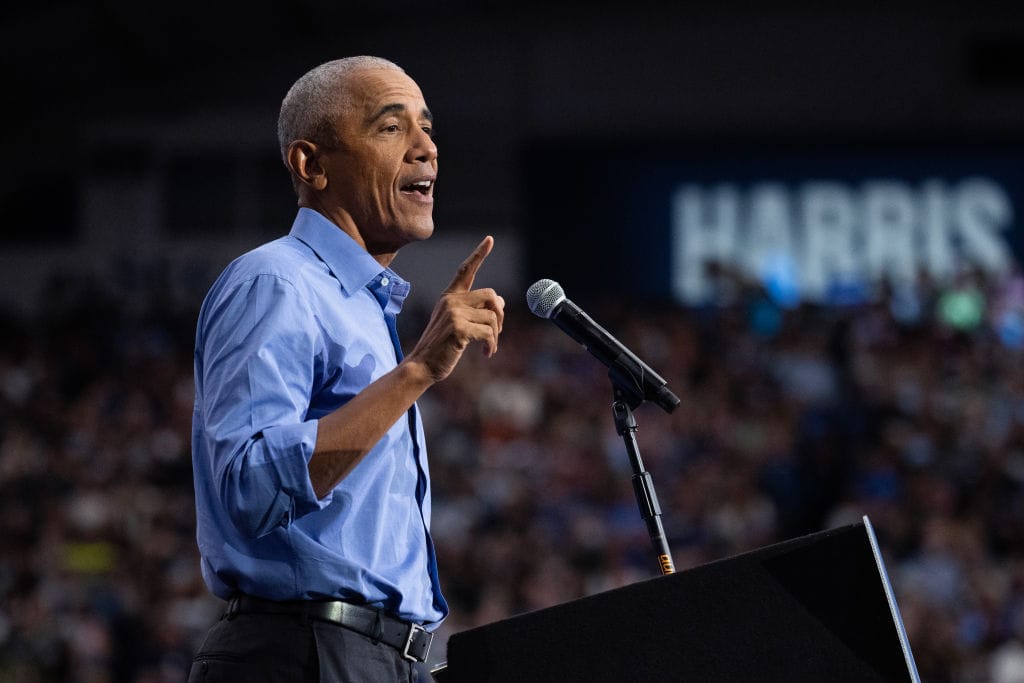Barack Obama Faces Backlash for Urging Black Men to Support Kamala Harris, Attributing Hesitancy to Sexism
Former President Barack Obama has sparked a significant backlash after comments made during a campaign rally in Pittsburgh for Vice President Kamala Harris. Obama directly addressed Black men, suggesting that their reluctance to support Harris could be rooted in sexism. His remarks have ignited a firestorm of controversy across social
Former President Barack Obama has sparked a significant backlash after comments made during a campaign rally in Pittsburgh for Vice President Kamala Harris. Obama directly addressed Black men, suggesting that their reluctance to support Harris could be rooted in sexism. His remarks have ignited a firestorm of controversy across social media and among political commentators.
Barack Obama out here talking down to black men like they are his personal slaves
— Hodgetwins (@hodgetwins) October 11, 2024
pic.twitter.com/I8fbLPmQEZ
During the event, Obama stated, "Part of it makes me think – and I’m speaking to men directly – part of it makes me think that, well, you just aren’t feeling the idea of having a woman as president, and you’re coming up with other alternatives and other reasons for that." This statement was interpreted by many as Obama implying that Black men's political choices were influenced by gender bias rather than policy or personal conviction.
The backlash was swift and vocal:
- Social Media Outcry: On platforms like X (formerly Twitter), many users expressed their frustration. One X user commented, "Obama's out of touch if he thinks this is just about sexism. Black voters, like all voters, have a variety of reasons for their choices." Another post read, "Lecturing Black men about sexism while ignoring real issues? That's not leadership, that's blame-shifting."
- Public Figures and Commentators: A prominent Black female Democrat was quoted saying, "For him to single out Black men is wrong. We need to respect their reasons, even if we might not agree." This sentiment was echoed by various figures who felt Obama's comments were dismissive of the complexities of voter decision-making.
- Political Analysis: Analysts pointed out that while Obama's intention might have been to galvanize support for Harris, his approach risked alienating a demographic crucial for Democratic success. "Obama's misstep might cost Democrats more than just goodwill; it could affect turnout," one political commentator noted.
- Support for Obama's Critique: Conversely, some supporters of Obama's comments argued that confronting underlying biases, including sexism, was necessary for progress. "If we can't address these issues head-on, how do we move forward?" a supporter argued on X, defending Obama's direct approach.
- Kamala Harris Campaign's Response: The Harris campaign has since intensified outreach efforts towards Black voters, aiming to counter the narrative of neglect or misunderstanding. This includes targeted ads and community engagements, focusing on policy issues relevant to Black communities rather than identity politics.
The incident has opened up a broader conversation about how political campaigns address voter demographics, particularly around issues of race, gender, and voter expectations. While some applaud Obama's honesty in addressing what he perceives as an issue within his own electorate, others criticize the approach as oversimplified and potentially divisive.
WATCH: Nina Turner smash Obama for saying "The Brothas" aren't backing Kamala Harris sufficiently, when black men have their reasons. #obama #kamalaharris #ninaturner pic.twitter.com/mlvr07wrGP
— VIRTUE.NEWS (@virtuemediacorp) October 13, 2024
This moment in the campaign has highlighted the delicate balance political figures must maintain when discussing sensitive issues like gender and race, especially within their voter base. The full impact of Obama's comments on the election remains to be seen, but it has undoubtedly stirred a significant reaction, reflecting deep-seated tensions and expectations within political discourse.
Oh man. Black Americans are DONE with Barack Obama. Listen to black voters respond to Obama trying to shame them into voting for Kamala.
— Benny Johnson (@bennyjohnson) October 14, 2024
These responses are🔥🔥🔥
We can now officially call Obama’s smug speech the greatest political backfire of all time… pic.twitter.com/m0e0Weh3ub




